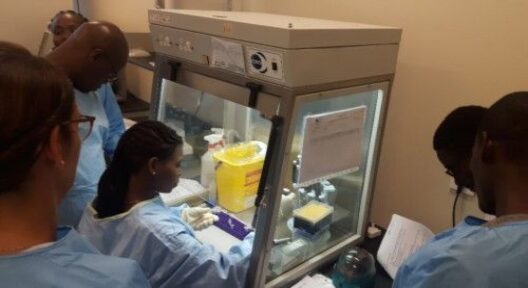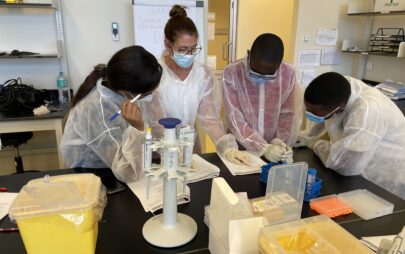SeqMDRTB_NET
Network for the Application of Sequencing Technologies for the Fight Against Resistant Tuberculosis in High Incidence Settings

Short Description
Multidrug-resistant (MDR) and extensively drug-resistant (XDR) tuberculosis (TB) represent an increasing threat for global tuberculosis (TB) control. Successful control of M/XDR-TB requires efficient drug susceptibility testing (DST) as basis for designing effective therapy regimens. However, e.g. due to inadequate infrastructure, DST is often missing or delayed in countries with medium or high TB incidence, leading to empirical treatment regimens with low cure rates. New molecular methods like Next Generation Sequencing (NGS) or targeting sequencing can provide accurate and rapid drug susceptibility results of clinical Mycobacterium tuberculosis complex strains. This project will support countries with a high TB incidence such as Moldova in Eastern Europe and Kyrgyzstan in Central Asia and three countries in Southern Africa, Eswatini, Namibia and Mozambique, in establishing sequencing technologies as diagnostic tools for the rapid prediction of drug resistance. Based on the rapid resistance prediction results, M/XDR-TB patients can be treated earlier with effective regimens, leading to higher cure rates as well as limiting the risk of further resistance development and M/XDR-TB transmission.
Aims of the Project
The overall aim of this project is to establish a sustainable competence network in countries with high TB-incidence. In this network the Central Asia state Kyrgyzstan, the East European country Moldova and three countries of Southern Africa, Namibia, Mozambique and the more recently included Eswatini, will be supported to implement modern sequencing technology (in part NGS) for rapid TB resistance diagnostics and surveillance.
Specific Goals
- Technology transfer by implementation of sequencing technologies in project countries
- Capacity building by different trainings: train the trainers, training laboratory experts, training in data analysis and interpretation, establishment of competence network
- Ensuring sustainability by integrating sequencing technology into national TB strategy
In Cooperation with
- Eswatini Ministry of Health, Eswatini
- Baylor Children’s Foundation, Eswatini
- The Ospedale San Raffaele: The San Raffaele Hospital (OSR), Italy
- The National Tuberculosis Center under the Ministry of Health of the Kyrgyz Republic, Kyrgyzstan
- The National Institute of Health, Mozambique
- Institute of Phthisiopneumology “Chiril Draganiuc”, Republic of Moldova
- School of Medicine – University of Namibia, Namibia
- Institute for Microbiology and Laboratory Diagnostics (IML), Germany
- The National Reference Laboratory for Mycobacteria and the WHO Supranational TB Reference Laboratory, Germany
Last update: April 2022

